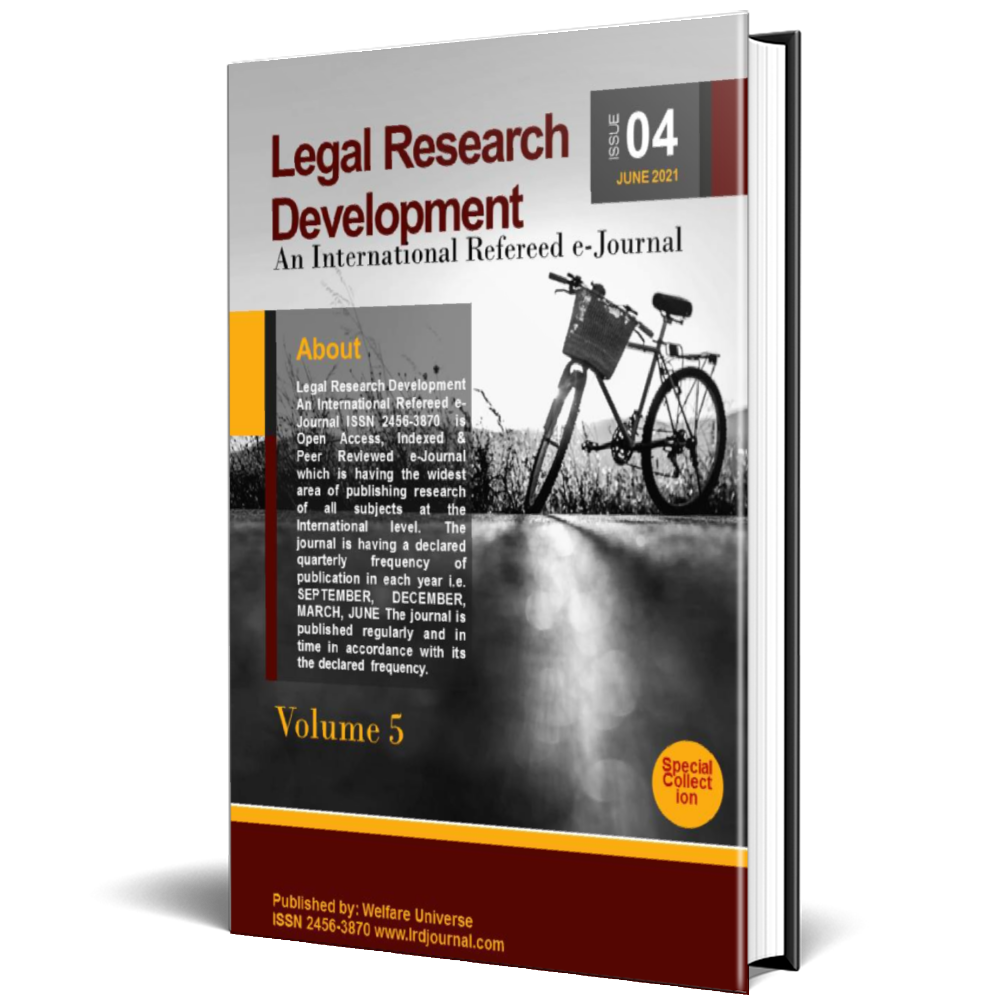Jurisdiction Issue in Cyberspace and International Principals
DOI:
https://doi.org/10.53724/lrd/v3n4.02Keywords:
Jurisdiction,, Cybercrime,, Jurisdictional Enforcement., Confession Law, International Law, Application of International Law by Courts, Protective Principle, Convention on Cyber CrimeAbstract
This paper tried to emphasis on the most crucial issue in cybercrime, which is jurisdiction. Exponential growth of cybercrime is a big problem for any developed or developing nation these days but the most problematic area is there jurisdiction. This research paper is an ex-post facto research and based on various theories and judgments take in international platform related to jurisdictional Issue. Recently in the case of Kulbhushan Jadhav, this issue was raised in international corridor that weather Pakistan got jurisdiction to heard and decide this case or not. In this case International court of justice hold the decision of the Pakistan Supreme Court. This paper is not concern about Kulbhushan case but only focusing on the fundamentals which work behind the jurisdictional issues in cyberspace. This paper is the attempt of an outcome to gauge the scope of state and international Jurisdiction in cyber space.
References
Apart from judicial activity, a State‟s administrative, executive and legislative activity is also part of its jurisdiction sovereignty
Lord Macmillan in Campania Naviera Vascogado v. Steamship, „Cristina‟, [1938] AC 485.
Vakul Sharma information Technology Law and practice- Cyber Laws and Laws regulating cyberspace, 5th edition- Universal publication, 2015
Information technology Act, 2008
Supra note3 ,
Ibid
In the absence of municipal laws, international treaties ratified by India can be taken into account for framing guidelines in respect of enforcement of fundamental rights [Vishaka v. State of Rajasthan, (1997) 6 SCC 241: 1997 SCC (Cri) 932; Lakshmi Kant Pandey v. Union of India, (1984) 2 SCC 244 (para 10)].
Ibid
Supra note3
PCIJ, SerA No. 9 (1927).
Nottebohm case (Liechtenstein v. Guatemala) (Second Phase), ICJ Rep 1955 4.
(1968) 36 ILR 5.
681 F Supp. 896 (1988).
See, International Convention Against The Taking of Hostage, 1979.
113 S. Ct 2891 (1993).
Supra note3
[1999] 2 WLR 827 (HL).
Ibid
Supra note3
Ibid
The Charter [of MT], which was in itself influenced by the American Constitution, went against the spirit of that very constitution, in as much as there is a specific prohibition in it against ex-post-facto laws. Section 9 and 10 of article 1 of the American Constitution provide that …… “No ex post facto law shall be passed by the Congress and on Stat shall pass any ex-post-facto law”. Similarly, the General Assembly of the United Nations on December 9, 1948 adopted the “Declaration of Human Rights”, of which the article 11(2) provides that: “No man shall be held guilt of any penal offence on account of any act or omission which did not constitute a penal offence under a national or international law, at the time when it was committed”.
Nuremberg and Tokyo Trials, Vol. 2.
Supra note3
The Statue (treaty) is in force (more than 66 nations have already ratified it).
Kennan and Brown, Crimes Against International Law.
Ibid
Ministers or their representatives from the following 26 Members States signed the treaty: Albania, Armenia, Austria, Belgium, Bulgaria, Croatia, Cyprus, Estonia, Finland, France, Germany, Greece, Hungary, Italy, Moldova, the Netherlands, Norway, Poland, Portugal, Romania, Spain, Sweden, Switzerland, “The Former Yugoslav Republic of Macedonia”, Ukraine and the United Kingdom. Other 4 members, Canada, Japan, South Africa and the United States, that took part in the drafting, also signed the trety.
Supra note3
(2001) 4 SCC 516.
Section 21 of the Extradition Act, 1962, provides that if a person is brought into India under an extradition decree, he cannot be tried in respect of an offence, which does not from part of the decree.
1955 AIR 367, 1955 SCR (1) 1284
Supra note3
Ibid
Supra note3
1950 AIR 155, 1950 SCR 573
Ibid
Downloads
Published
How to Cite
Issue
Section
License
Copyright (c) 2019 Legal Research Development: An International Refereed e-Journal ISSN: 2456-3870

This work is licensed under a Creative Commons Attribution-NonCommercial 4.0 International License.










